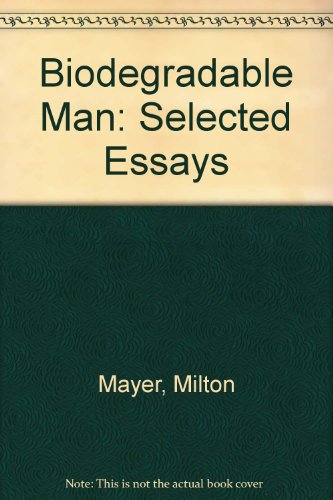For more than fifty years, educator and journalist Milton mayer produced sharp-witted, sharp-tongued political and social commentary. "Biodegradable man" gathers thirty-two articles from the pages of "The Progressive," for which Mayer was a roving reporter and regular contribution from 1942 to 1986, as well as from magazines such as "Harpers," the "Massachusetts Review," and the "Christian Century." Including some of his most representative pieces, especially those from the 1970s and 1980s, this generous gathering is often humourous, but always purposeful in intent. Whether writing on social issues, religion, politics, family, or travel, Mayer had a gift for making his own thoughts and experiences relevant to his readers. "The Tomb," the story of his visit to a neighbor's do-it-yourself atomic bomb shelter, brings home the futility of preparing for a nuclear holocaust. "Man with a Country" recounts his successful legal battle with the State Department to have the loyalty oath removed from passport applications.
In "Bed," a hymn to the glories of the double bed, he says that "we are all preoccupied with the unspeakable indecencies of politics, none of us with the innocent splendours of bed." More than half-seriously, Mayer suggests that the world's leaders be put in bed together and not allowed to rise until they reach a better understanding of one another. The primacy of the liberal arts in education was Mayer's ongoing concern - a theme addressed in "The Ivory Tower of Babel" and his portrait of University of Chicago president Robert Maynard Hutchins. Decrying educational practices that "trained" rather than "educated" students, he writes that "the purpose of education is not a job; that's the purpose of apprenticeship. the purpose of education is human freedom." "Rendered Unto Caesar," a classic of war resistance literature, not only chronicles Mayer's ongoing struggle with the Internal Revenue Service over his refusal to pay taxes for war but also shows his ability to find new and provocative stances on current issues - stances for which the magazines that published his work often lost subscriptions. This is his assessment of John F.Kennedy's famous lines, "Ask not what your country can do for you; ask what you can do for your country" : "When Mr.
Kennedy spoke these words at his inaugural, I knew that I was at odds with a Society which did not immediately rebel against them. They are the words of totaliterianism pure". Like the ACLU, to which he pays tribute in this volume, Mayer believed there were no circumstances in which injustice should be tolerated. Neither capitalists nor communists, the lawless nor the meekly lawful, Richard Nixon nor Mayer's own neighbours escaped his probing pen. As new generations will discover, however, optimism pervaded even his most iconoclastic pieces. He never left his readers despairing but rather expecting better of themselves and their institutions.
- ISBN10 0820312444
- ISBN13 9780820312446
- Publish Date 7 September 1999
- Publish Status Out of Print
- Out of Print 19 October 2003
- Publish Country US
- Imprint University of Georgia Press
- Format Hardcover
- Pages 320
- Language English
